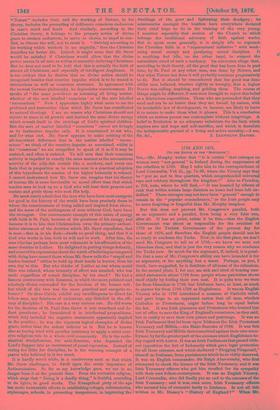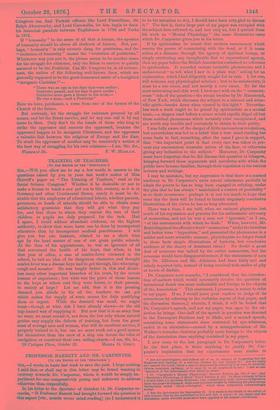1798 AND 1876.
(TO TER EDITOR OF THE "SPECTATOR.") Srn,—Mr. Murphy writes that " it is certain " that outrages on- women were "not general" in Ireland during the suppression of the rebellion in 1798. May I refer him to the correspondence of Lord Cornwallis, Vol. iii., pp. 74-89, where the Viceroy says that he "put an end to free quarters, which comprehended universal~ rape and robbery throughout the kingdom ?" Also to Plowden, p. 702, note, where he will find,—" It was boasted by officers of rank that within certain large districts no home had been left un- defiled." These outrages may not have been " general " enough to• remain in the " popular remembrance," or the Irish people may be more forgiving or forgetful than Mr. Murphy imagines.
But this does not prevent Mr. Congreve's parallel, both, as an argument and a parallel, from being a very false one, after all. It has no point, unless it be this,—that the English Government was about as responsible for the cruelties of 1798 as the Turkish Government of the present day for those of 1876, and therefore the English people should not be so ready to condemn the Turks. Now, in the first place, we don't need Mr. Congreve to tell us of 1798,—we know we were not blameless then, and that is just the very reason why we condemn the Turks now. So much for the argument, if, indeed, it is possi- ble that a man of Mr. Congreve's ability can have intended it for an argument, or for anything but a taunt. Perhaps, as you, I think, have suggested, he is destitute of all sense of the ridiculous, In the second place, I, for one, am sick and tired of hearing one- sided statements about 1798 from people whose patriotism shows itself chiefly by foaling their own nest. It is quite true we were far from blameless in 1798, but Irishmen have, at least, as much to answer for from 1796-1798 as Englishmen. It was an English Viceroy who in 1796 introduced a measure of Catholic relief, and gave hope to an oppressed nation that all men, whether Catholics or Protestants, might before long be equal before the law. It was Irish placemen and Protestants who hunted him out of office to save the King of England's conscience, as they said, but in reality to save their own places and patronage. It was an Irish Parliament that let loose upon Irishmen the Irish Protestant Yeomanry and Militia,—the Bashi-Bazouks of 1798. It was this Irish Yeomanry and Militia that committed against their own coun- trymen by farthe greater part of the excesses which Englishmen to- day regard with horror. It was an Irish Parliament that passed with- out opposition the Act of Indemnity which gave legal protection for all these excesses, and which sheltered " Flogging Fitzgerald," himself an Irishman, from punishment which he so richly deserved. It was an English commander, Sir Ralph Abercromby, who first attempted to check the licence of the Irish Yeomanry, and it was Irish Yeomanry officers who got him recalled for his sympathy with their own fellow-countrymen. It was an English Viceroy, Lord Cornwallis, who did finally put an end to the excesses of the Irish Yeomanry ; and it was, once more, Irish Yeomanry officers who accused him of excessive lenity to Irishmen. Is not all this written in Mr. Massey's " History of England ? " When Mr..
Congreve can find Turkish officers like Lord Fitzwilliam, Sir Ralph Abercromby, and Lord Cornwallis, let him begin to draw his historical parallels between Englishmen in 1798 and Turks in 1876.
If " humanity " be the sense of all that is human, the apostles of humanity should be above all students of history. But, per- baps, " humanity " is only exoteric slang for positivism, and the " evolution of humanity " means the "evolution of positivism.'! Whichever way you put it, the phrase seems to be another name for the struggle for existence, only the fittest to survive is quietly assumed to be the Positivist. Can Mr. Congreve be, in all serious- ness, the author of the following well-known lines, which are generally supposed to be the good-humoured satire of a benighted "inorganic Christian ?"—
" There was an ape in the days that were earlier ; Centuries passed, and his hair it grew curlier ; Centuries more gave a thumb to his wrist,— He was a man,—and a Positivist"
Here we have, perchance, a verse from one of the hymns of the Church of the future.
But seriously, let the struggle for existence proceed by all means, and let the fittest survive, and let any one call it by any
name he likes. Only don't tie the hands of those who long to strike the oppressor and succour the oppressed, because the -oppressed happen to be inorganic Christians, and the oppressor -a valuable link between the religions of Europe and the East. To crush the oppressor of another may be somebody's notion of the best way of struggling for his own existence.—I am, Sir, &c.,



































 Previous page
Previous page